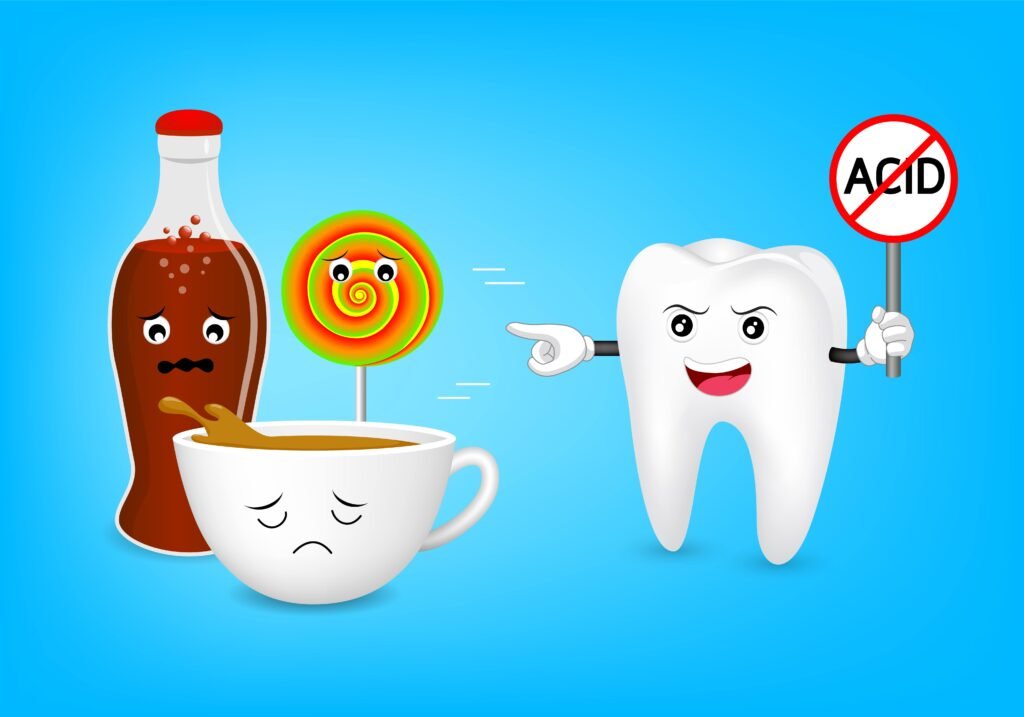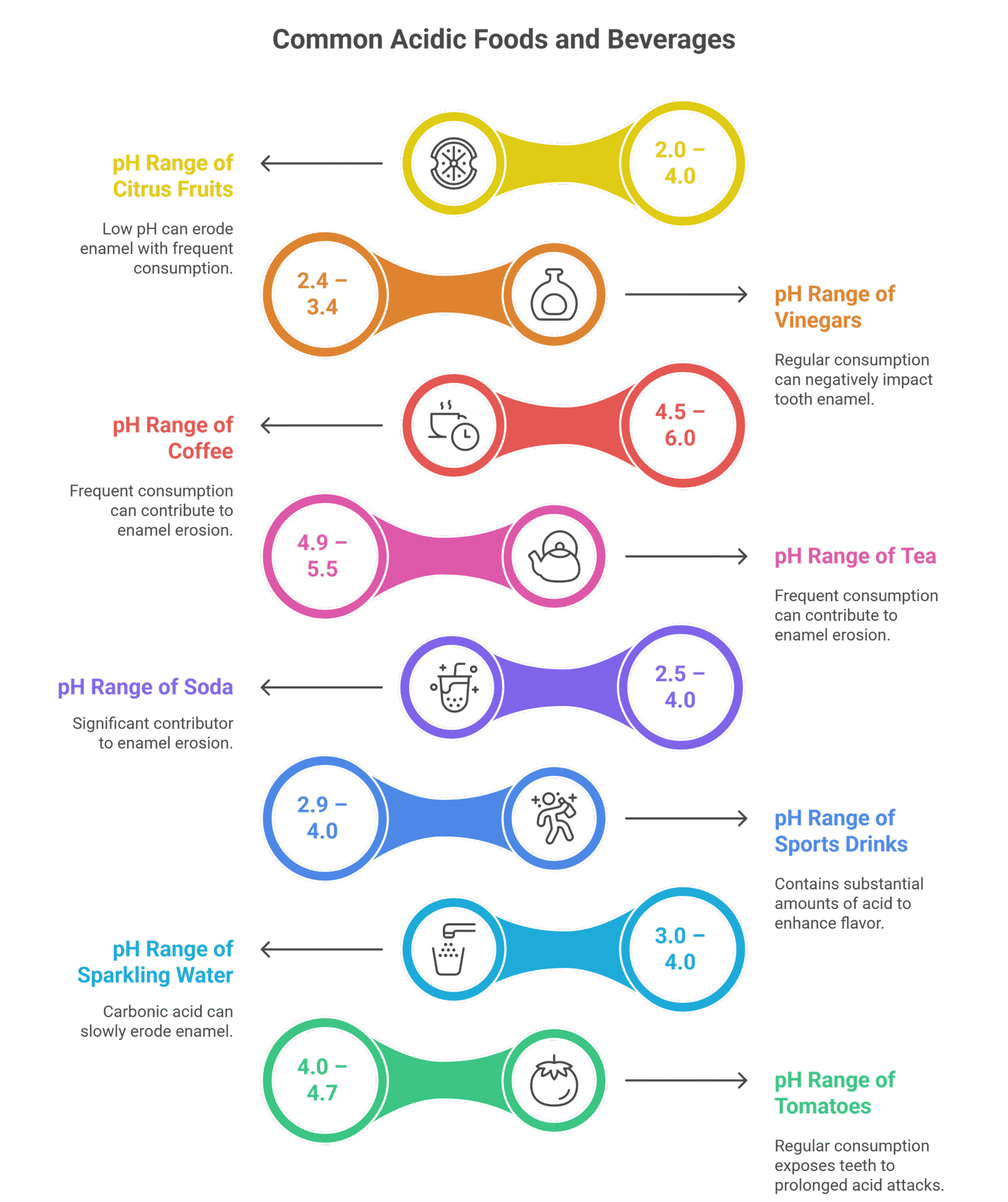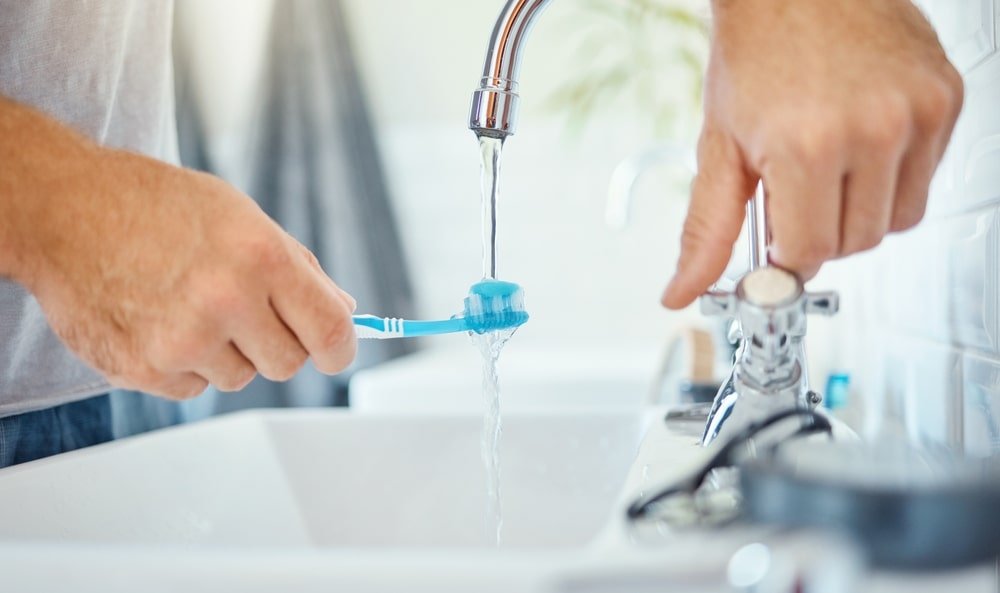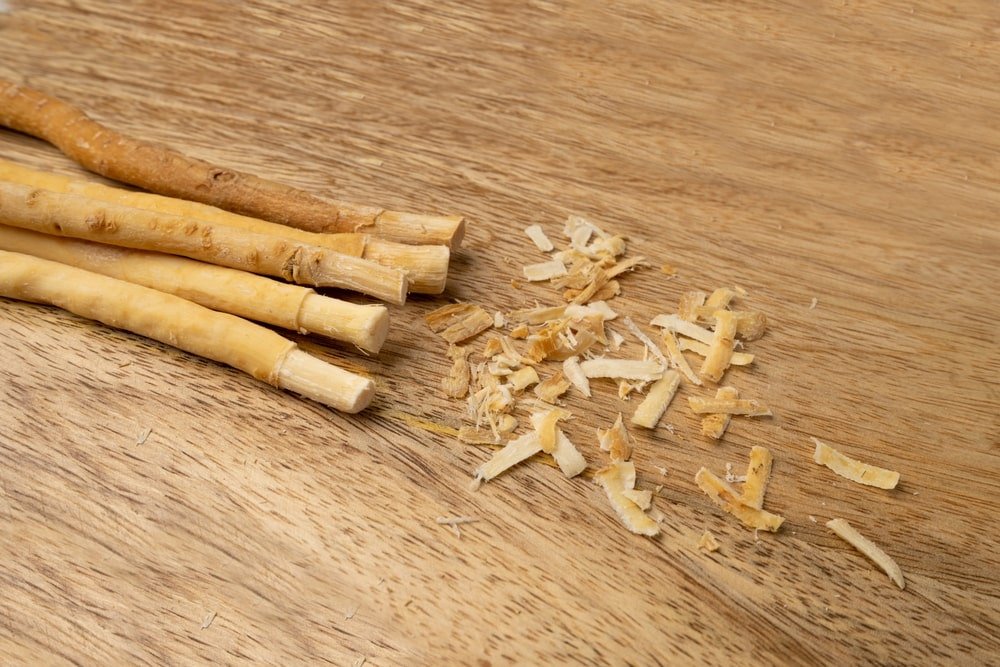“Have you ever noticed a sudden “”zing”” in your teeth after sipping a cold drink or biting into something sour? Or perhaps your teeth look a little duller than they used to? These subtle signals might be your body’s way of telling you that your tooth enamel, the protective shield of your teeth, is under attack – often from a surprising culprit: the foods and beverages you consume every day. It might sound counterintuitive, but many seemingly “”healthy”” foods and drinks can be surprisingly harsh on your teeth. We often focus on sugar as the main enemy of oral health, but acidity plays an equally, if not more, significant role in tooth erosion and sensitivity. At White Tooth Dental, we believe in empowering you with knowledge so you can enjoy your favorite foods and drinks without compromising your beautiful smile.
Let’s uncover the hidden world of acidic foods and how to keep your enamel strong and healthy.
The Silent Thief: Understanding Enamel Erosion and Sensitivity
Imagine your tooth enamel as the strongest shield in your body.
It’s the tough, outermost layer of your teeth, designed to protect the softer, sensitive inner layers (dentin and pulp) from daily wear and tear, chewing forces, and temperature changes. It’s truly remarkable!
When Acid Strikes: The pH Power Play
Here’s where science comes into play without getting too technical. Acidity is measured on the pH scale, which ranges from 0 (most acidic) to 14 (most alkaline).

A neutral pH is 7, like pure water. Your mouth thrives at a nearly neutral pH, typically around 7.
However, when you introduce foods or drinks with a low pH (acidic), your mouth’s pH drops.
When the pH in your mouth dips below 5.5, your enamel begins to demineralize. Think of it like a delicate dance: the acids literally start dissolving the hard mineral structure of your enamel. This is what we call enamel erosion.
While your saliva is amazing at naturally buffering these acids and helping to remineralize your enamel (adding back lost minerals), frequent and prolonged exposure to acid can overwhelm this natural defense system.
Over time, this constant cycle of demineralization without sufficient remineralization leads to gradual enamel loss.
The Uncomfortable Truth: What is Tooth Sensitivity?
As enamel erodes, it becomes thinner, exposing the underlying layer called dentin. Dentin is a porous tissue made up of tiny tubes that lead directly to the tooth’s nerve center.
When these tubes are exposed, hot, cold, sweet, or sour stimuli can reach the nerve, causing that sharp, often sudden, pain we know as tooth sensitivity. It’s your teeth telling you they’re vulnerable.
The Usual Suspects: Common Acidic Culprits

You might be surprised by some of the items on this list! Many everyday favorites, some even considered healthy, can contribute to enamel erosion due to their high acidity.
Citrus Fruits
While packed with Vitamin C, fruits like lemons, limes, oranges, and grapefruits are highly acidic. The pH of lemon juice, for instance, can be as low as 2-3.
- Examples: Lemons, oranges, grapefruits, tangerines.
- pH Range: 2.0 – 4.0
Vinegars
Often used in salad dressings and cooking, vinegars (like apple cider vinegar, balsamic, and white vinegar) are very acidic.
- Examples: Apple cider vinegar, balsamic vinegar, white vinegar.
- pH Range: 2.4 – 3.4
Coffee & Tea
Your daily brew, especially black coffee, can be quite acidic. Even some teas, particularly black teas, can contribute to erosion.
- Examples: Black coffee, some black teas.
- pH Range: Coffee (4.5 – 6.0), Tea (4.9 – 5.5)
Sports Drinks & Sodas (Including Diet and Sparkling Water)
These are perhaps the biggest culprits. Many sports drinks contain significant amounts of acid to enhance flavor and shelf life.
Soft drinks, both regular and diet, are highly acidic. Even sparkling water, which might seem harmless, contains carbonic acid, which can slowly erode enamel over time if consumed frequently.
- Examples: Colas, lemon-lime sodas, energy drinks, many flavored sports drinks, plain sparkling water.
- pH Range: Soda (2.5 – 4.0), Sports Drinks (2.9 – 4.0), Sparkling Water (3.0 – 4.0)
Tomatoes and Tomato Products
Tomatoes and tomato-based sauces (like pasta sauce or ketchup) are naturally acidic.
- Examples: Fresh tomatoes, tomato sauce, ketchup.
- pH Range: 4.0 – 4.7
Wine
Both red and white wines are acidic, and frequent sipping can expose teeth to prolonged acid attacks.
- Examples: Red wine, white wine.
- pH Range: 2.9 – 4.0
Dried Fruits & Sour Candies
While delicious, dried fruits are not only sugary but also concentrated in acids. Sour candies are a double whammy: high in sugar and very acidic.
- Examples: Raisins, apricots, sour gummies.
- pH Range: Varies widely, but typically low (e.g., cranberries < 3.0)
It’s important to remember that it’s not just what you eat, but how you eat it that matters.
Sipping on an acidic drink throughout the day, for example, provides a prolonged acid bath for your teeth, which is more damaging than consuming it quickly with a meal.
This continuous exposure means your saliva doesn’t get enough time to neutralize the acid and help remineralize your enamel.
Your Enamel Protection Plan: Actionable Strategies
Don’t worry, we’re not asking you to give up all your favorite foods! The goal is to minimize the erosive effects of acidic culprits. Here’s how:
Smart Consumption Habits
Read more on how smart nutrition can bolster your oral surgery healing fast!
- Timing is Everything: Enjoy acidic foods and drinks during meals. When you eat, you produce more saliva, which helps wash away acids and buffer their effects. Snacking on acidic foods or sipping drinks throughout the day keeps your mouth in an acidic state for longer, maximizing erosion.
- Use a Straw: For acidic beverages like soda, sports drinks, or even iced coffee, use a straw to minimize direct contact with your teeth. Position the straw towards the back of your mouth.
- Don’t Swish or Hold: Avoid swishing acidic drinks around your mouth or holding them in your mouth for extended periods. Drink them relatively quickly.
- Pair with Neutralizers: Consume acidic foods alongside or immediately followed by non-acidic, enamel-friendly foods.
- Dairy Products: Milk, cheese, and yogurt are excellent. Cheese, in particular, stimulates saliva flow and contains calcium, which helps neutralize acids and remineralize enamel.
- Crunchy Vegetables: Carrots, celery, and apples (less acidic varieties) help stimulate saliva flow and can gently clean teeth.
- Water: Always have water on hand to rinse your mouth.
Crucial Post-Consumption Care
This is where many people make a common, yet harmful, mistake!
- The “Wait to Brush” Rule: After consuming acidic foods or drinks, your enamel is temporarily softened. Brushing immediately can literally brush away softened enamel, causing more damage. Instead, wait at least 30-60 minutes before brushing your teeth. This gives your saliva time to neutralize the acids and start the remineralization process.
- Rinse with Water: After consuming acidic items, simply rinse your mouth thoroughly with plain water. This helps wash away residual acids and brings your mouth’s pH back to neutral more quickly.
- Chew Sugar-Free Gum: Chewing sugar-free gum stimulates saliva flow, which is your mouth’s natural defense against acid. Look for gums containing xylitol, which has additional benefits for oral health.

Optimal Oral Hygiene (The Right Way)
- Use Fluoride Toothpaste: Fluoride is a superhero for your enamel. It strengthens enamel and helps in the remineralization process, making your teeth more resistant to acid attacks. Look for toothpastes with stannous fluoride, which is particularly effective in reducing sensitivity and strengthening enamel.
- Gentle Brushing Technique: Always use a soft-bristled toothbrush. Aggressive brushing, especially when enamel is already weakened by acid, can accelerate erosion and contribute to gum recession. Brush gently in small, circular motions.
- Don’t Forget to Floss: Flossing removes plaque and food particles from between your teeth and along the gumline, areas where acids can linger and damage enamel.
For a deeper dive into maintaining a healthy smile, explore our Preventive Care Tips section.
Regular check-ups and cleanings, part of our General Services, are also crucial for catching and addressing any early signs of erosion or sensitivity.
Myth vs. Fact: Separating Dental Truth from Fiction
Let’s clear up some common misconceptions about acidic foods and your teeth:
- Myth: Diet soda is safer for your teeth than regular soda.
- Fact: While diet soda is sugar-free, it’s still highly acidic due to ingredients like phosphoric and citric acid. These acids are just as erosive to enamel as the acids in regular soda, if not more so.
- Myth: You should brush your teeth immediately after every meal to keep them clean.
- Fact: As we discussed, brushing immediately after consuming acidic foods or drinks can actually harm your softened enamel. Wait at least 30-60 minutes.
- Myth: Enamel can regrow on its own.
- Fact: Unfortunately, once tooth enamel is eroded, it cannot grow back naturally. However, saliva and fluoride can help remineralize weakened enamel, making it stronger and more resistant, but they can’t replace lost structure. This is why prevention and early intervention are so critical.
When to Seek Professional Help: Recognizing the Signs
Even with the best at-home care, sometimes enamel erosion progresses, or sensitivity becomes severe. Here are signs that it’s time to visit us at White Tooth Dental:
- Increased Sensitivity: If your teeth are consistently sensitive to hot, cold, sweet, or sour foods, especially if it’s a new or worsening problem.
- Discoloration: As enamel thins, the yellowish dentin underneath can become more visible, making your teeth appear more yellow or dull.
- Transparency: The edges of your front teeth might start to look translucent.
- Rounded or Cupped Edges: Your teeth may appear rounded, or you might notice small indentations on the chewing surfaces of your teeth.
- Increased Chipping or Cracking: Eroded enamel is weaker and more prone to chipping or cracking.
If you’re experiencing any of these symptoms, don’t hesitate to reach out.
Our team can assess the extent of the erosion and discuss potential solutions, from professional fluoride treatments to restorative options.
Learn more about how we can help manage Dental Sensitivity and restore your smile.
Beyond Diet: Other Contributors to Enamel Erosion
While diet is a major factor, other conditions can also contribute to enamel erosion and sensitivity:
- Acid Reflux (GERD): Chronic acid reflux can bring stomach acids up into your mouth, repeatedly bathing your teeth in highly erosive acid.
- Certain Medications: Some medications can cause dry mouth, reducing saliva production and thus your mouth’s natural buffering capacity.
- Teeth Grinding (Bruxism): While not acidic, grinding and clenching can wear down enamel, especially when combined with acid exposure.
- Abrasive Brushing: Brushing too hard, especially with a hard-bristled toothbrush, can wear away enamel, particularly if combined with acidic diet.
Can miswak restore enamel?
From the present analyses, we conclude that brushing with nano calcium carbonate toothpaste or miswak toothpaste for the equivalent of 2 and 4 weeks restore the hardness of demineralized tooth enamel. However, even after the equivalent of 4 weeks brushing, neither toothpaste restores the initial hardness completely.

Your Personalized Enamel Protection Plan: Next Steps
At White Tooth Dental, led by Dr. Kristina Pahuta, we believe in a holistic approach to oral health, understanding that your diet and habits play a significant role in your overall well-being.
Protecting your enamel from acidic foods and beverages is a proactive step towards a healthier, happier smile.
Here’s your personalized action plan:
- Be Mindful of Your Menu: Review the list of acidic culprits and identify areas where you can make small changes.
- Optimize Your Habits: Incorporate smart consumption techniques and the crucial “”wait to brush”” rule.
- Reinforce with Fluoride: Use fluoride toothpaste and discuss professional fluoride treatments with your dentist.
- Listen to Your Teeth: Pay attention to signs of sensitivity or erosion.
- Talk to Your Dental Team: We are your partners in oral health. If you have concerns about sensitive teeth, enamel erosion, or simply want to create a personalized prevention plan, we’re here to help.
Ready to take the next step in protecting your smile? Contact White Tooth Dental today to schedule a consultation.
We’re conveniently located in Toronto, Ontario, and dedicated to providing comprehensive and compassionate dental care for your whole family.”



